 Start Right Reader, Grade 2, Book 4 (Into Reading)
2867545
Start Right Reader, Grade 2, Book 4 (Into Reading)
2867545
|
Houghton Mifflin Harcourt Publishing Company
|
9781328825957 |
2020 |
NIMAC restricted
Contains images
|
|
 Start Right Reader, Grade 2, Book 5 (Into Reading)
2867573
Start Right Reader, Grade 2, Book 5 (Into Reading)
2867573
|
Houghton Mifflin Harcourt Publishing Company
|
9781328825964 |
2020 |
NIMAC restricted
Contains images
|
|
 Start Right Reader, Grade 2, Book 6 (Into Reading)
2867602
Start Right Reader, Grade 2, Book 6 (Into Reading)
2867602
|
Houghton Mifflin Harcourt Publishing Company
|
9781328825971 |
2020 |
NIMAC restricted
Contains images
|
|
 Start Right Reader, Grade K, Book 1 (Into Reading)
2864524
Start Right Reader, Grade K, Book 1 (Into Reading)
2864524
|
Houghton Mifflin Harcourt Publishing Company
|
9781328695338 |
2020 |
NIMAC restricted
Contains images
|
|
 Start Right Reader, Grade K, Book 2
2864542
Start Right Reader, Grade K, Book 2
2864542
|
Houghton Mifflin Harcourt Publishing Company
|
9781328701978 |
2020 |
NIMAC restricted
Contains images
|
|
 Start Right Reader, Grade K, Book 3 (Into Reading)
2864586
Start Right Reader, Grade K, Book 3 (Into Reading)
2864586
|
Houghton Mifflin Harcourt Publishing Company
|
9781328825872 |
2020 |
NIMAC restricted
Contains images
|
|
 Start Right Reader, Grade K, Book 4 (Into Reading)
2864607
Start Right Reader, Grade K, Book 4 (Into Reading)
2864607
|
Houghton Mifflin Harcourt Publishing Company
|
9781328825889 |
2020 |
NIMAC restricted
Contains images
|
|
 Start Right Reader, Grade K, Book 6 (Into Reading)
2864651
Start Right Reader, Grade K, Book 6 (Into Reading)
2864651
|
Houghton Mifflin Harcourt Publishing Company
|
9781328825902 |
2020 |
NIMAC restricted
Contains images
|
|
 Start Right Reader, Grade K, Book 7 (Into Reading)
2864701
Start Right Reader, Grade K, Book 7 (Into Reading)
2864701
|
Houghton Mifflin Harcourt Publishing Company
|
9781328826053 |
2020 |
NIMAC restricted
Contains images
|
|
 Start Right Reader, Grade K, Book 8 (Into Reading)
2864684
Start Right Reader, Grade K, Book 8 (Into Reading)
2864684
|
Houghton Mifflin Harcourt Publishing Company
|
9781328826046 |
2020 |
NIMAC restricted
Contains images
|
|
 Start Right Reader, Grade K, Book 9 (Into Reading)
2864665
Start Right Reader, Grade K, Book 9 (Into Reading)
2864665
|
Houghton Mifflin Harcourt Publishing Company
|
9781328826039 |
2020 |
NIMAC restricted
Contains images
|
|
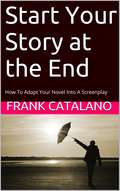 Start Your Story at the End: How to Adapt Your Novel into a Screenplay
1276043
Start Your Story at the End: How to Adapt Your Novel into a Screenplay
1276043
|
Frank Catalano
|
9781625175991 |
2014 |
|
|
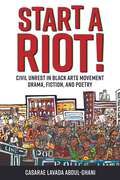 Start a Riot!: Civil Unrest in Black Arts Movement Drama, Fiction, and Poetry (Margaret Walker Alexander Series in African American Studies)
5939459
Start a Riot!: Civil Unrest in Black Arts Movement Drama, Fiction, and Poetry (Margaret Walker Alexander Series in African American Studies)
5939459
|
Casarae Lavada Abdul-Ghani
|
9781496840431 |
2022 |
|
|
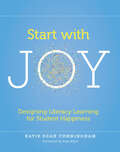 Start with Joy: Designing Literacy Learning for Student Happiness
5645756
Start with Joy: Designing Literacy Learning for Student Happiness
5645756
|
Katie Cunningham
|
9781003843412 |
2019 |
Contains images
|
|
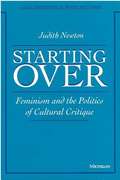 Starting Over: Feminism and the Politics of Cultural Critique
1135532
Starting Over: Feminism and the Politics of Cultural Critique
1135532
|
Judith Newton
|
9780472094820 |
1994 |
|
|
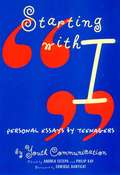 Starting With I: Personal Essays By Teenagers
731170
Starting With I: Personal Essays By Teenagers
731170
|
Edwidge Danticat
Youth Communication Staff
Andrea Estepa
Philip Kay
|
9780892552283 |
1997 |
|
|
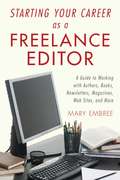 Starting Your Career as a Freelance Editor: A Guide to Working with Authors, Books, Newsletters, Magazines, Websites, and More (Starting Your Career)
2358343
Starting Your Career as a Freelance Editor: A Guide to Working with Authors, Books, Newsletters, Magazines, Websites, and More (Starting Your Career)
2358343
|
Mary Embree
|
9781621535973 |
2012 |
Contains images
|
|
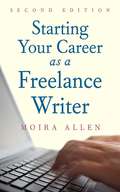 Starting Your Career as a Freelance Writer
913736
Starting Your Career as a Freelance Writer
913736
|
Moira Anderson Allen
|
9781581157772 |
2011 |
Contains images
|
|
 Starting Your Career as a Freelance Writer (Second Edition)
290688
Starting Your Career as a Freelance Writer (Second Edition)
290688
|
Moira Allen
|
9781581157772 |
2011 |
Contains images
|
|
 Starting Your Career as a Freelance Writer (Starting Your Career Ser.)
2355246
Starting Your Career as a Freelance Writer (Starting Your Career Ser.)
2355246
|
Moira Allen
|
9781621535591 |
2011 |
Contains images
|
|
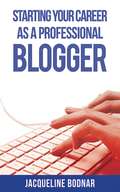 Starting Your Career as a Professional Blogger (Starting Your Career)
2355090
Starting Your Career as a Professional Blogger (Starting Your Career)
2355090
|
Jacqueline Bodnar
|
9781621532859 |
2013 |
Contains images
|
|
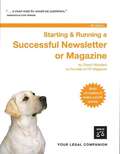 Starting and Running a Successful Newsletter or Magazine (5th edition)
84464
Starting and Running a Successful Newsletter or Magazine (5th edition)
84464
|
Cheryl Woodard
|
9781413305234 |
2006 |
|
|
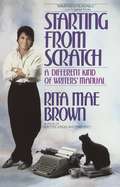 Starting from Scratch: A Different Kind of Writers' Manual
3994146
Starting from Scratch: A Different Kind of Writers' Manual
3994146
|
Rita Mae Brown
|
9780307794000 |
1986 |
Contains images
|
|
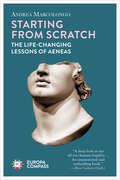 Starting from Scratch: The Life-Changing Lessons of Aeneas
6445111
Starting from Scratch: The Life-Changing Lessons of Aeneas
6445111
|
Andrea Marcolongo
|
9781609457501 |
2020 |
Contains images
|
|
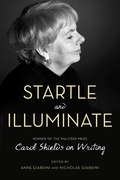 Startle and Illuminate: Carol Shields on Writing
1226648
Startle and Illuminate: Carol Shields on Writing
1226648
|
Carol Shields
Anne Giardini
|
9780345815965 |
2016 |
Contains images
|
|